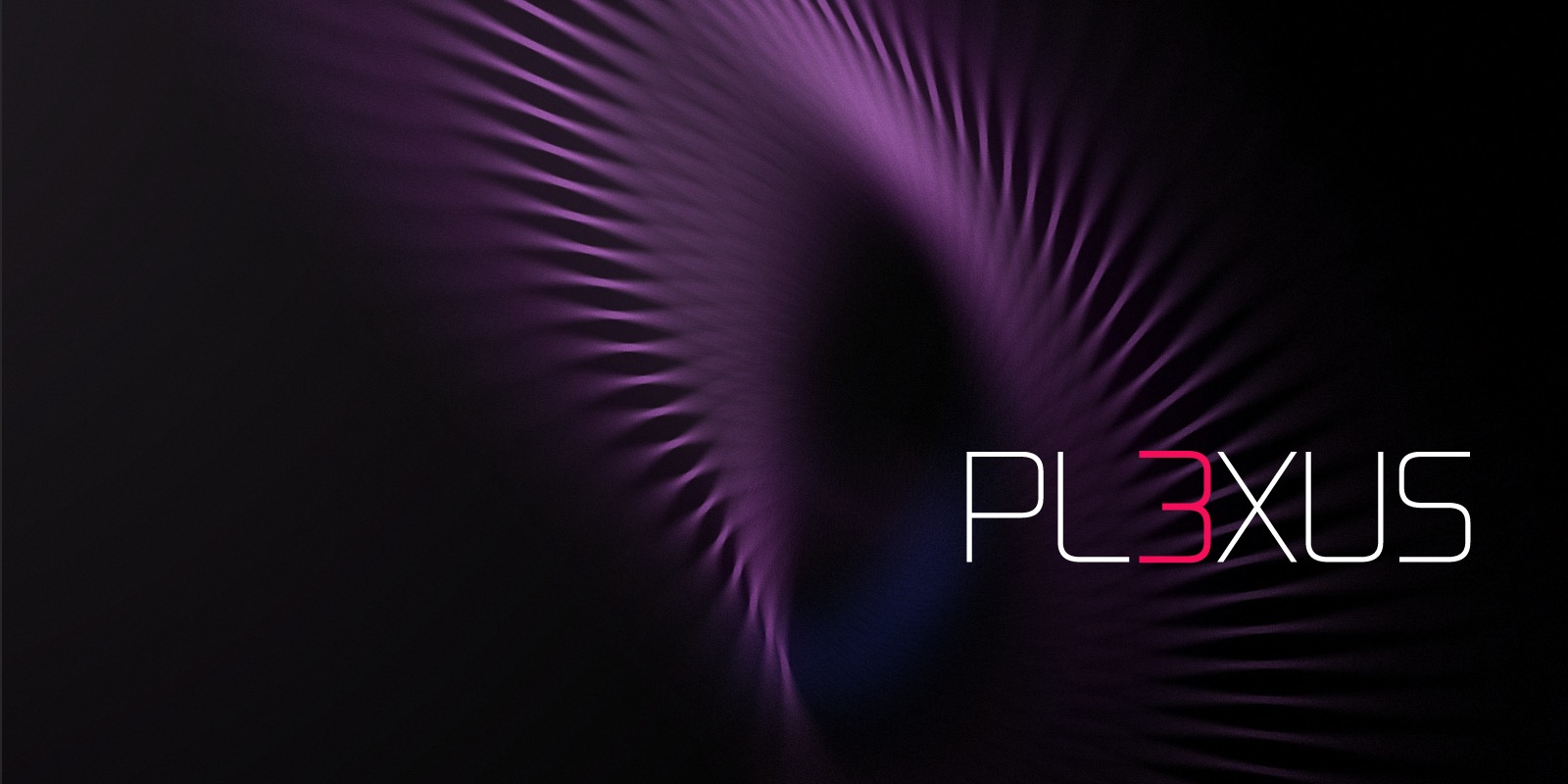Plexus
Plexus is a plug-in designed to bring generative art closer to a non-linear program like After Effects. It lets you create, manipulate and visualize data in a procedural manner. Not only you can render the particles, but also create all sorts of interesting relationships between them based on various parameters using lines and triangles. The workflow for Plexus is very modular allowing you to create truly infinite set of configurations and parameters.
Make sure to checkout the Gallery and follow the Vimeo Group for various types of work created using Plexus. If you want to make yourself familiar with Plexus checkout our Tutorials page and also the Documentation.
What's new in Plexus 3?
Object based UI
Plexus 3 comes with a tree based Object Panel, that helps you organize multiple Plexus objects with in the layer. It improves workflow dramatically and the panel itself is dockable anywhere with in After Effects. It helps you keep track of your Geometry Objects, Effector Objects, Render Objects and Groups by allowing you to select only what you need so no more scrolling through a long Effects Control Window.
Motion Blur

Finally. Now along with Depth of Field, you can add Motion Blur to create cinematic animations. You can use either comp settings or custom camera shutter values.
Sound Effector
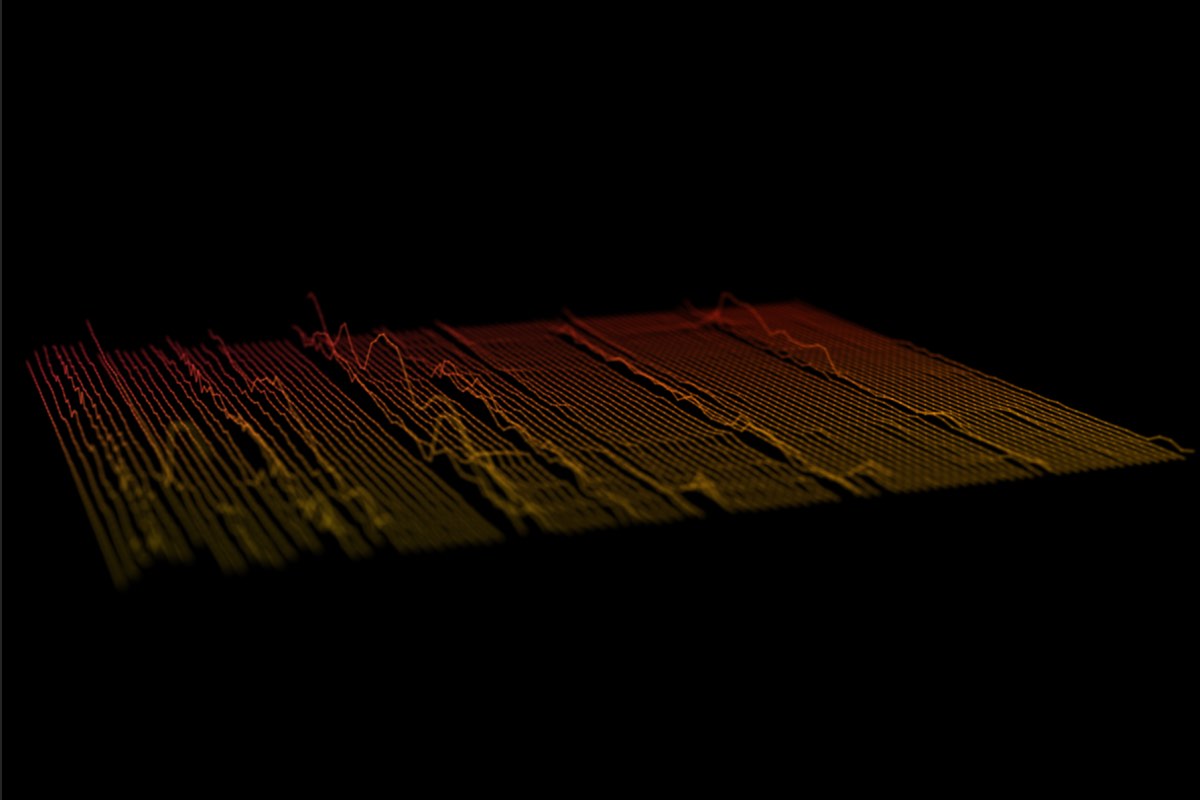
A new Sound Effector Object let’s you sample a waveform from a sound layer in AE and apply it to vertex position or scale or color. You can also Echo the sampled waveform so that the sound is sampled over time.
Slicer Object
The Slicer Object let’s you ‘slice’ through a mesh and create interesting visualizations. It works best with OBJ meshes and can be used very well along with the instance object.
Seamless Beams
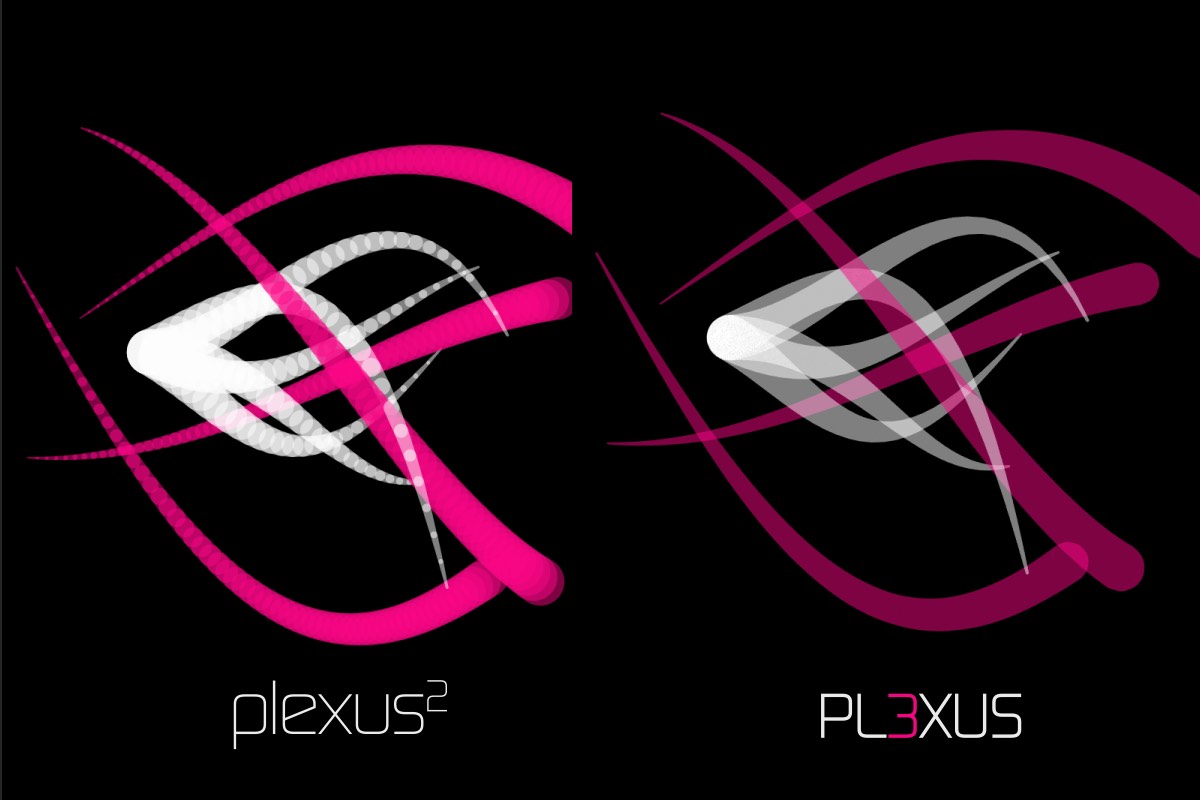
Render sweeping volumetric beams with seamless rendering. Beams no longer show any ‘overlapping joints’. Not only it improves rendering performance, but also renders much more accurate colors.
Designed for AE’s New Architecture
Plexus 3 was designed from the ground up to take advantage of AE’s new multi-threaded architecture introduced in 13.5. That means better support for Persistent Caching, better performance and the best part, automagically refresh Instances. You can have many nested instances and all the changes are automatically detected. Also, just in case you need to refresh cache, a new button that let’s you do that with a single click without affecting caches of other layers.
Depth Map Culling
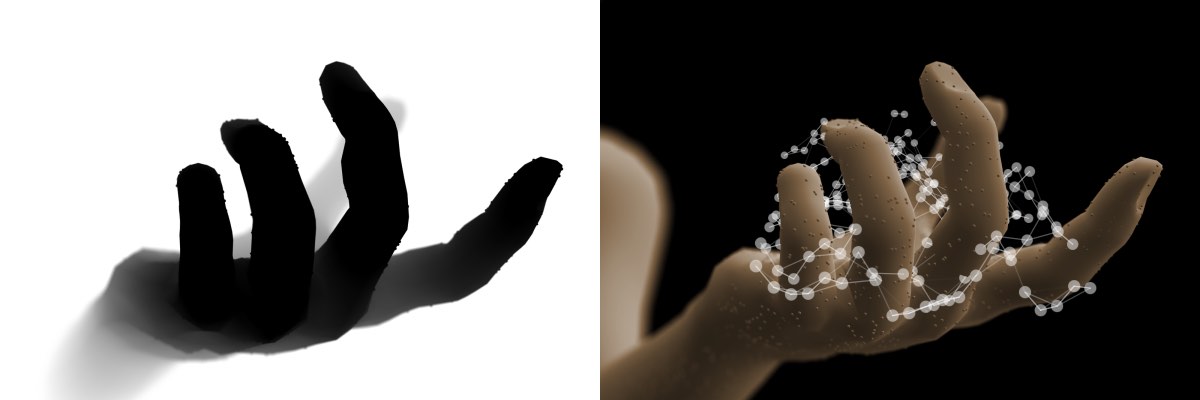
You can use a Depth Map exported by a 3D program or Buena Depth Cue to occlude pixels directly. It helps composite Plexus in 3D scenes with ease.
Improved OBJ Import
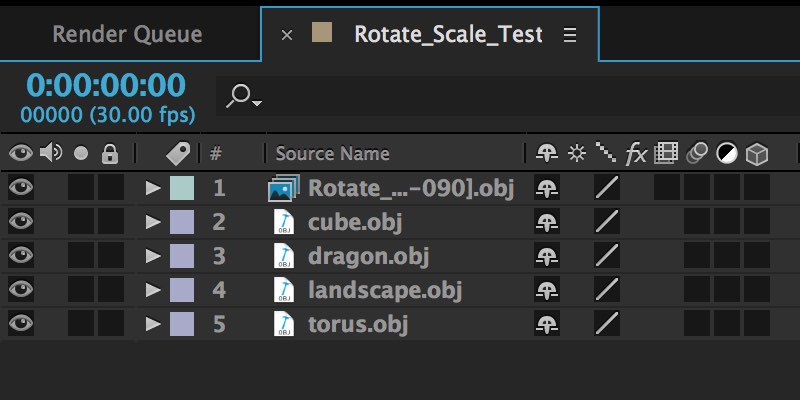
You can now import OBJ files and file sequences using AE’s default file importer, which helps you organize footage better and collect project files. OBJ Object now also imports normals and texture co-ordinates along with vertex positions and facets.
Nested Compositions
Collapse Transforms for a nested composition, and Plexus behaves like a native AE composition. It reacts to Camera and lights of the native composition. It allows you to pre-comp Plexus layers and still have the flexibility to animate Camera movements.
Null Object Performance
Null Objects have similar performance to point lights if you’re running the latest version of After Effects. No need to convert Nulls exported from 3D applications to point lights anymore.
Path Object Improvements
Path Object is improved with scaling controls for replication and tessellation for closed paths. Now there is yet another way to create 3D text in After Effects, but make it a little more interesting.
Custom Visibility Settings
You can gradually fade or vanish points, lines or polys when they get close to the camera or far away from the camera. You can also custom hide polygons that face towards or away from the camera.
Unified Rendering
Unified rendering allows all objects to have a common 3D space. It allows points, lines & polys created by multiple objects to intersect with one another in z-space.
Loop Noise
You can seamlessly loop noise values for animations. You can cycle through noise evolution and it works for position, scale & color values.
Main Features:
These are some of the main features of Plexus. For a more detailed overview of all the features, make sure to check out the Tutorials section and also the Documentation.
-

Lines
Create Lines and Other interactions and control their properties based on the position and distance between the particles.
-
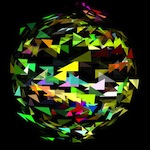
Facets & Facet Effectors
Generate Facets between the particles and control their properties using Facet Effectors.
-

Triangulation
Triangulate and create new surfaces on the fly with in-built triangulation modes. You can also control the triangulation by various parameters like distance between the particles etc.,
-
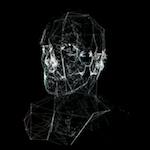
OBJ Sequences
Import vertices and facets from OBJ files and OBJ file sequences created in your favorite 3D modeling application. Plexus ships with a OBJ Sequence Exporter for Cinema4D at no cost.
-
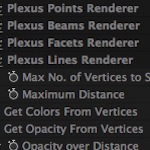
Modular Workflow
Plexus has a modular workflow which consists for various objects. You can have infinite number of objects and different combinations which gives you complete control and flexibility.
-

Graph UI Parameters
Graph based parameters let you control various properties like color, opacity and thickness based on user drawn graphs. You can also choose preset graph flows if necessary.
-

Text Layer Integration
Plexus integrates seamlessly with the text layers in After Effects. It automatically creates particles based on the outlines of the text layers and you can create various text based transitions with ease.
-
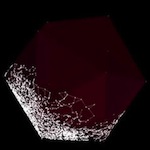
Containers
You can contain all the particles in a container which can be either spherical, cubical or a custom OBJ object. Containers help restrict the movement of the particles.
-
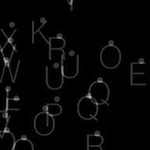
Sprites
Render custom sprites based on the particle data and also randomize them. You can also render multiple custom sprites per particle which is very helpful for Infographics.
-
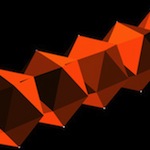
Instances
Create multiple instances and also nest those instances into another instance object and create multiple instances of that object. Crazy right? Its recursion for the crazy minded.
-
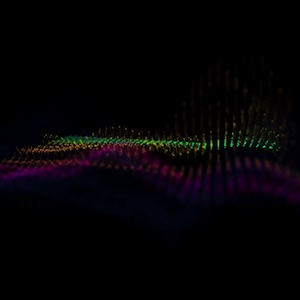
Sound Effector
Sample a waveform from a sound layer in AE and apply it to vertex position or scale or color. You can also Echo the sampled waveform so that the sound is sampled over time.
-
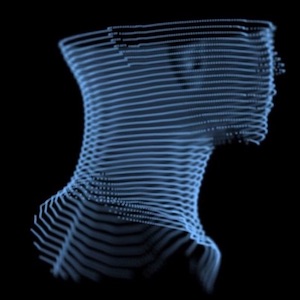
Slicer Object
The Slicer Object let’s you ‘slice’ through a mesh and create interesting visualizations. It works best with OBJ meshes and can be used very well along with the instance object.
-
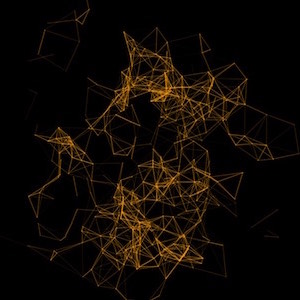
Noise/Field Effectors
Use Lights to create and control various force fields using Noise and Spherical Effectors. You can seamlessly loop noise values for animations. You can cycle through noise evolution and it works for position, scale & color values
-
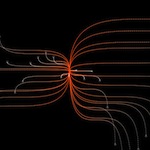
3D Seamless Beams
Beam lines from particles of one object to another or in between various particles of the same object. You can control various properties of the beams using graph based parameters.
-
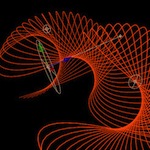
3D Splines
Finally! Now you can create 3D Splines and stroke them with ease natively with in After Effects. Not only that, you can replicate them in 3D space.
-
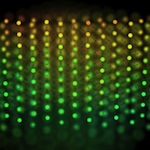
Camera/Depth of Field
Plexus interacts natively with AE's Camera and produces HQ OpenGL accelerated Depth of Field effects.
-

SVG Sequence Export
Export entire Composition or the current Work area to an SVG Sequence. You can choose the right frame to print later or use them all in sequence to play an animated sequence.
-
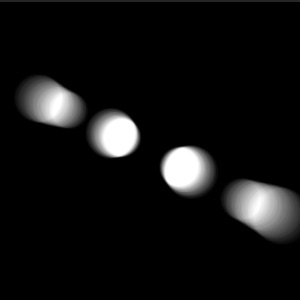
Motion Blur
Create cinematic animations using Motion Blur. You can choose to use AE's comp settings or manually override shutter values to create really dramatic motion blur.
-
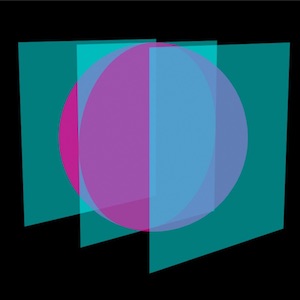
Unified Rendering
Unified rendering allows all objects to have a common 3D space. It allows points, lines & polys created by multiple objects to intersect with one another in z-space.
-
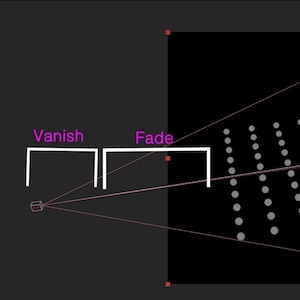
Visibility Settings
You can gradually fade or vanish points, lines or polys when they get close to the camera or far away from the camera. You can also custom hide polygons that face towards or away from the camera.
-
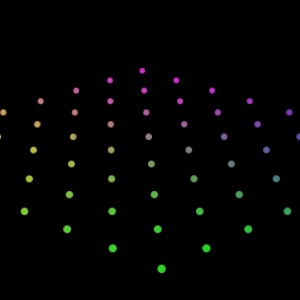
Color Maps
Use Color Maps to affect the position, color or scale of points.
-
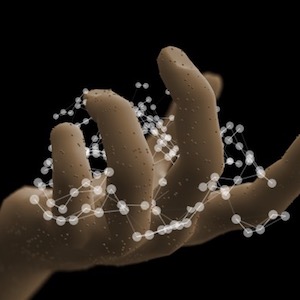
Depth Map Culling
You can use a Depth Map exported by a 3D program or Buena Depth Cue to occlude pixels directly. It helps composite Plexus in 3D scenes with ease.
(Distributed by aescripts + aeplugins)
Upgrade Information
You can upgrade to Plexus 3 from Plexus 2 for $99.99. If you're a Plexus v1 user, you can upgrade directly to Plexus 3 for $149.99. To get the upgrade pricing you will need an aescripts + aeplugins account with the same email as your original purchase. You can contact Aescripts Support for more information.
Compatibility
Plexus is compatible with Adobe After Effects CS6 and Creative Cloud on both Windows (Windows 10 or above) and Macintosh platforms (macOS 10.11 or above).
Support
If you are having a support issue for any of the products, please contact us for a quick response.
Download
Version: 3.2.7
Last Updated: Jan 20 2025

